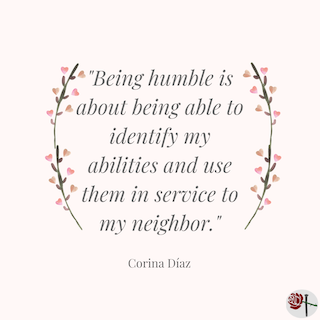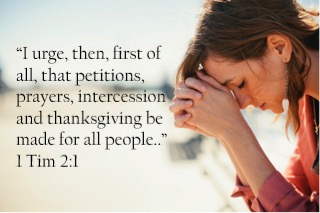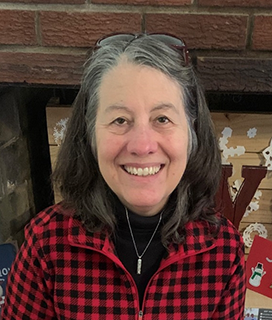-
Humility, What I Thought
 Written by Corina Diaz, volunteer with Iron Rose Sister Ministries in Argentina.
Written by Corina Diaz, volunteer with Iron Rose Sister Ministries in Argentina.Humility is a quality or value that allows us to recognize our limits and accept them, in this sense, it invites us to reflect on our ego and our true nature.
At one point in my life, I considered that humility had to do with humiliation and modesty before others, so I had a tendency to lower my self-esteem in order to maintain a humble attitude. However, when I realized that it is about another concept, perhaps a little more positive, then my perspective changed. Being humble is about being able to identify my abilities and us them in service to my neighbor. So, why do we have to hide what we do well to appear humble? This is not necessary, and Jesus gives us a clear example in Luke 9:46-48:
“An argument started among the disciples as to which of them would be the greatest. Jesus, knowing their thoughts, took a little child and had him stand beside him. Then he said to them, “Whoever welcomes this little child in my name welcomes me; and whoever welcomes me welcomes the one who sent me. For it is the one who is least among you all who is the greatest.””
As I read this message from Jesus, I want to think about how a child thinks. Children do not lower their self-esteem to help others, on the contrary, they insist many times on helping. They also tend to accept the people around them without prejudice, and depending on their age, they do not know anything about ego, they simply give what they have to give and practice what they have learned. The disciples wondered who would be the greatest, perhaps thinking of wisdom or actions that they had accumulated over their time with Jesus, but what a surprise! Jesus Himself tells them that there is someone much greater than them, someone who does not know everything they know, but who is capable of approaching things with a mind free of prejudices and with the simple intention of learning: a child.
God does not have a scorecard for each one of us, but He is pleased with those who add their gifts in service to the Kingdom of God. Appreciating our own gifts and using them reveals an attitude of humility that only God can recognize in us. When we evaluate what we are capable of doing or not, we are preparing ourselves to serve in a better way, that is, to stop the pride of saving our qualities solely for our personal achievements. Rather, we allow Jesus to show us the best way to use them. Thus we become like a child who comes with a pure heart bringing what he has barely learned and wanting to allow it to be used without selfish intentions.
-
I am the daughter of the Almighty and in Him I find comfort
 Written by Nilaurys Garcia, Iron Rose Sister Ministries volunteer in Chile
Written by Nilaurys Garcia, Iron Rose Sister Ministries volunteer in ChileLabels are very useful to identify spices and to differentiate between salt and sugar in the kitchen. When moving, they help us know where the fine china is so that we can be careful to not break it. They can also identify who we can ask questions when we are at a tourist site, travel office, sporting event, or in other places.
In the same way that labels have their positive aspects, they also have their negative side when they are used to judge.
Opinions are more impactful when they come from those we most love, our physical family, our spiritual family, friends, coworkers, or classmates. And on those days when we feel down, if someone gives us a strange look, we can feel hurt.
Can you think of a time in which the labels of Christian and single might have a negative connotation?
The way in which you define yourself, at times, can be different from the way in which others see you, simply because we are using different lenses. If you do not live your life in the way that the world wants you to and you have not met the world’s standards, like having a partner, a stable job, kids, an academic title, and being highly recognized across your continent, I invite you to take a deep breath and repeat with me, “He has made everything beautiful in its time. He has also set eternity in the human heart; yet no one can fathom what God has done from beginning to end” (Eccl. 3:11, NIV).
If you’re like me, others have made you feel bad for being single. I want to remind you that you are important because you are a daughter of God, not because of your marital status. “The Spirit himself testifies with our spirit that we are God’s children” (Rom. 8:16). You are not incomplete as some may think. You have not missed your chance. And you will not be the bitter old lady with the cats.
If you have suffered for the cause of Christ, if you have lost your job because you decided you could not be part of a certain situation, or if your own family questions why you study the Bible, why you connect to that Zoom meeting, or why you gather with that group on Sundays, I encourage you to keep the faith. I know it hurts, but the reward far outweighs any suffering and we have the great Comforter. “For just as we share abundantly in the sufferings of Christ, so also our comfort abounds through Christ” (2 Cor. 1:5).
You are I my prayers. You are not alone. You are worthy and I invite you to repeat, “I am a daughter of the Almighty and in Him I find comfort.”
-
If They Divide Us, They Will Conquer Us – Don't Let the Challenges of Relationships Cost Us the Victory
Written by Nilaurys Garcia, volunteer with Iron Rose Sister Ministries in Canada

What a joy it is when you get along with all of the people in your circle, or those with whom you associate. There is a sense of peace in those moments and it can be even a little scary because you wonder when something might go wrong in one of those relationships. If I tell you that having differences of opinion is normal and that you can't get along with everyone all of the time, chances are, you'd agree with me. It's easy to have a good relationship with someone with whom you always get along and who thinks like you. It requires more effort when there have been exchanges of not-so-friendly words or when the other person has hurt your feelings.
You may have heard the phrase, “divide and conquer.” It is a well-known strategy in games, in wars, and in situations where the enemy must be separated so their strength will be weakened, most of the time because they will not have the support of a team. Sometimes I have used this strategy to complete a project by having the team split up the tasks and thereby conquering the goal.
Taking it to a more personal and relational level, I have tried to divide or separate people from the way they behaved in the past. I remember who they are and how they responded, and that helps me have a clearer and more objective approach as I deal with the current situation. While a negative impression based on past events will certainly impact our response, it should not determine the way we deal with a current situation. When we separate the bad from the good, we will get better results. A relationship can change a lot when the context is changed, meaning the place, the other participants, and even the topics of conversation.
I like to think about the opposite of “divide and conquer,” the sum of everyone’s efforts can outweigh each individual’s work. It sounds a bit complicated, but there´s a reason why the opposite works very well against enemies. Returning to the strategy where activities are separated to achieve a common goal, much more can be achieved when we collaborate for the fulfillment of an objective since there is support and complement. A biblical example is that a rope made of three strands is more difficult to break. "
Though one may be overpowered, two can defend themselves. A cord of three strands is not quickly broken!" (Eccl. 4:12 NIV)
The relationship we have with Christ is easier if we do it in community, instead of trying to do it on our own. On more than one occasion I have needed help from my family in Christ to face a situation, reaffirm my faith, and get much closer to our Creator. When thinking about how to counteract the effects of division, a story that comes to mind is found in Exodus 17:8-13, when Joshua leads the people in battle against the Amalekites.
Moses supported the Israelite army from the top of a nearby hill by holding up the rod of God. If Moses lowered his arms, the enemy would overpower Joshua’s army. To achieve victory, Aaron and Hur supported Moses, holding up both of his arms until sunset. Isn't this story wonderful? I get excited knowing that the united support of a few and the efforts of many gave the victory to Israel. I wonder what would have happened if Aaron had been angry with Moses over some argument between brothers and refused to help him. It would be a very different ending.
Although I have had moments when I have wanted to surrender, I have had the support of the people with whom I have relationships to encourage me to move forward. I see this in the effort of my brethren in preventing the enemy from dividing and conquering me in my Christian walk. When we have differences with others, we cannot let disagreement become a barrier in our relationships, destroy unity, or let one of our brothers or sisters fall simply because they have a different opinion from ours. And at other times, it might very well be me that is the difficult person to love, and the one who needs my loved ones to see beyond my complicated attitude.
Would you join me in staying united to protect the people of God?
-
In a Nutshell
 Written by Wendy Neill
Written by Wendy Neill
Does the idea of sharing your faith with a friend cause you to break out into a sweat? Sometimes, I feel that way. What do I say? Where do I begin?1 Corinthians 15 is a great place to turn. In verses 1 through 8, Paul gives us the gospel in a nutshell. It is of “first importance”.
• Christ died for our sins, according to the scriptures (it was foretold)
• He was buried
• He was raised, according to the scriptures
• He appeared to Peter, to the Twelve, to more than 500 brothers, to James, to all the apostles and to Paul himself.There you go. Simple, yet so profound. Succinct, yet life-altering. If you have a friend who thinks Christianity is just a myth or a conspiracy, that last bullet point is especially important. If people made this up, they wouldn’t have mentioned that many witnesses of the resurrection, especially witnesses that were still living at the time and could verify the facts. Many of those witnesses died for their faith. They wouldn’t have been willing to die if it was all a lie.
So remember 1 Corinthians 15. It will help you focus on what is important, and it is strong evidence for the truth of the resurrection.
-
In God’s Embrace
 Written by Pamella Sevillano, volunteer with Iron Rose Sister Ministries in João Pessoa, Brazil.
Written by Pamella Sevillano, volunteer with Iron Rose Sister Ministries in João Pessoa, Brazil.Have you ever thought about the love and care a mother has for her children?
If you’re a mother, you know what I’m talking about, and if you’re not, you can imagine it.When we are expecting, we think about every detail for their arrival. Where their room is going to be, where they will sleep, what clothes they’re going to wear, and lots of other things.
When I start thinking about my experience as a mother, and the preparation for my kids' arrivals, I can imagine how God prepared everything for Jesus’ arrival here on earth. How He chose the way His Son would come to the world, how He chose Mary and Joseph as his parents, in what cultural and political context Jesus would come, and how He prepared just everything for His birth. God is a caring Father and we can see this clearly in Jesus’ earthly life.
Just like some of us mothers are always making sure our kids have the best opportunities for growth, always wondering if they are okay, if they are in good company, if they are eating well enough to be healthy. We can also see that as Jesus grew, God provided new paths and relationships that helped Him evolve in all phases of life.
Nothing compares to the love of God, but something similar is the love of a mother for her children.
Isaiah 49:15 says:
“Can a mother forget the baby at her breast
and have no compassion on the child she has borne?
Though she may forget,
I will not forget you!”And the intense love God has for Jesus is the same love He has for us as His children.
“See what great love the Father has lavished on us, that we should be called children of God! And that is what we are! The reason the world does not know us is that it did not know him.” (1 John 3:1)
Just as God loves us intensely and we love our children intensely, we also want our children to love us and the Lord. We want them to seek us in moments of happiness and sadness, of relief and distress, of peace and pain…the same way Jesus looked for the Father.
There are several examples of this in the Bible:
- After he had dismissed them, he went up on a mountainside by himself to pray. (Matt. 14:23a)
- Very early in the morning, while it was still dark, Jesus got up, left the house and went off to a solitary place, where he prayed. (Mark 1:35)
And even in one of the most well-known times, when he went alone to the Mount of Olives and prayed:
- “Father, if you are willing, take this cup from me; yet not my will, but yours be done.” (Luke 22:42)
We long to embrace our kids, care for them and love them. Jesus knew the power of God’s embrace, and He always made sure to seek it. The Lord’s embrace is transformative. Most of the time, life is still going to be hard (Jesus Himself still had to go through the cross), but the love and protection we receive when we submit ourselves to Him is healing, like a mother’s hug.
May we, as sons and daughters of God, never forget His love, care and protection. And know that He loves us unconditionally, as He loved Jesus His Son.
#IronRoseSister #HIStories #loveofGod #Godsembrace #loveoftheFather #guestwritter #blog
-
In the Breach
 Written by Débora Rodrigo de Racancoj
Written by Débora Rodrigo de Racancoj
I know that feeling. I have experienced it many times. God, who knows my situation, who observes me from his Holy throne, sees all this injustices occurring on earth, His earth, which He created with His voice. Why does not He do anything? He has the solution in His hand. A simple word from Him is enough for the injustice that is destroying the people around me to cease; for the battle in which I have been buried all this time to end... Why, Lord? -
In the heart of Ananias and Sapphira
 By Johanna Zabala, volunteer with Iron Rose Sister Ministries in Ecuador
By Johanna Zabala, volunteer with Iron Rose Sister Ministries in EcuadorDo you know what is the first thing that our Heavenly Father formed in us? The heart. Yes, our heart, this being the first purposeful organ that God himself designed in the fertilization process. How wonderful! Let's look at Psalm 139:13-24. From the womb of each mother, He formed us. What a blessing! All details, thoughts, purposes, plans, and tests are and will be in Him and for Him.
Also, in the book of Jeremiah in chapter 1:5-10 (CEV), it says:
““Jeremiah, I am your Creator, and before you were born, I chose you to speak for me to the nations.” I replied, “I'm not a good speaker, Lord, and I'm too young.” “Don't say you're too young,” the Lord answered. “If I tell you to go and speak to someone, then go! And when I tell you what to say, don't leave out a word! 8 I promise to be with you and keep you safe, so don't be afraid.” The Lord reached out his hand, then he touched my mouth and said, “I am giving you the words to say, and I am sending you with authority to speak to the nations for me. You will tell them of doom and destruction, and of rising and rebuilding again.””
Given this text, it is extensively highlighted that we are of God, as His most beautiful creation, so we must continually seek to purify ourselves in His presence. Over time, I have taken a close look at the compelling need In each facet of life… that we should strive that our hearts be in the likeness of God's heart, as expressed in Proverbs 4:23.
I have considered that especially when we are growing up, a large percentage of information that we own automatically is acquired from our environment, from the good and the bad of everything. In that learning, dad and mom will always have a significant role in the individual structure of each person.
Every day we see many marital situations in any family, and some are even narrated in the Bible. When reading the book of Acts, specifically in chapter 5, verses 1 to 11, there is the couple Ananias and Sapphira, a union like any other, with possible spiritual struggles; and they, based on the context, had material possessions and properties. Both belonged to the church that met to serve the Lord. However, their hearts were far from what God wanted for them; dishonoring the Holy Spirit, when He knows everything about us.
Feelings and desires come from the human heart, marriage being one of them. It is a Christian duty to keep the marital union set apart for God inside and outside the church. We are all called to show the identity of Christ. It is not an easy task, but it is necessary with a pure and respectful heart.
From the testimony of Ananias and Sapphira, we must never let go of the relationship with the Heavenly Father from our intimacy; this is essential. We can be tempted to stray from God's blessing to the curse. If we, as women of God, allow marriage not to be an example in everything and not to be a team of faith and trust in God, or we let Satan fill the heart of either one, lying, pretending, and not loving the will of God, we can fall and die irretrievably.
The marriage that God designed for us is a supreme plan of Himself. He wants it to be for a holy purpose. He wants us to be a team, to be one with Him.
All this invites us to be aware of what we are and what we have under the presence of the Creator and His immense love for each one of us. In other words, each relationship requires sincerity, love for one's neighbor, obedience, and intimacy with God in every decision and action. Adding that we have an opportunity for changes for the Heavenly Father, which leads us to constantly heal our hearts. Over time it has been contaminated and, if we don't realize it, it can make us sick both spiritually and physically.
Ananias and Sapphira died both spiritually and physically. They had their attention on having money and not on the truth of the Lord. Free will is true, but lying greedily and without repentance, is something God hates and destroys.
Let us ask the eternal Father in prayer that we don’t fill our hearts with evil but with Him. Likewise, that we may be purified daily and that He keep our marriages in holiness and love, in Christ Jesus. Let us never delight in a lie, however small it may be; for the father of lies is Satan (Jn. 8:44).
Let's analyze this then: who do I serve, the Father of Truth or the father of lies? Am I irreverent in the presence of the Creator? Do I allow the Heavenly Father to search my heart? Do I work in fear and love of God? Am I really going to be the right help for my husband?
#IronRoseSister #HIStorias #lies #truth #holymarriage #pureheart #guestwriter #blog
-
Intentional Teaching Through Relationships
 Written by Karyn Dancy, volunteer with Iron Rose Sister Ministries in Arkansas
Written by Karyn Dancy, volunteer with Iron Rose Sister Ministries in ArkansasThere are many different styles of teaching. What I’ve found most effective, though, is intentional teaching through relationships. Paul gives us examples of this, especially in his relationship with Timothy.
I used to be a classroom teacher at the elementary level. I worked in two low-performing schools and I was told from the beginning by other teachers that these children were worthless. It was appalling to me that anyone would say such a thing. As a new teacher, I went in, excited to share some of the resources I’d learned about in school with the other teachers, and the response was actually that these children weren’t worth the effort. This started my determination to show those children and their families that they were very valuable and capable. I wanted them to know they weren’t limited by the expectations of others, not even teachers.
I set out to show the students and their families that they were important to me by building relationships with them. I learned about their cultures and invited them to share things in the classroom that were important to them. Many of them came from immigrant families, so we had a great opportunity to share the diversity of their cultures in the classroom.
Each month we featured a language of the month. The quiet signal for that month would be counting to five in that language and I would teach the kids common words. They would earn points for good behavior, and then at the end of the month, we would have a cultural celebration. (We weren’t allowed to have “parties.”) I invited parents to share about their cultures and bring food for the kids to sample. One particular family was a great example of how that relationship benefited their student. Our language of the month was Samoan. When I asked the student’s mother to help me with the basics of the language, she not only did so but also became active in the classroom in many other ways. Previously her son had not been the best student, but once his mom took an interest in the class, so did he. It was like they were invested in the learning process once they felt valued. It turned out that the student’s grandfather was a tribal chief back in Samoa and had made a video of how to harvest coconut. The student’s mom brought the video in to share with the whole class.The way it all worked out, once I’d built a foundation of relationship with these children and their families, they came alongside me and cared about what I had to share with them. I was able to teach more effectively because they trusted me. When there was any particular difficulty, for example, math with fractions, we’d explore different activities that would help them until we found what worked best for them.
These students were sixth graders at the time. It’s been about 18 years now, and I still keep in touch with some of those families. It was a very rewarding experience.
Similarly, Paul built a relationship with Timothy. Then Paul mentored and equipped Timothy to follow him as he followed Christ, and Timothy was then able to do the same with his students. Paul didn’t only want his students to learn information; he wanted them to act on that knowledge. Paul said in 1 Corinthians 9:19 that he became like the people he was teaching so that those people could relate to him and believe. Paul shows us through his example how a teacher positively reinforces through encouragement, modeling, and monitoring. The relationship didn’t end when he handed things over to a student to become a teacher. He followed up because it was a true relationship, not simply a means to an end.
Since you’re reading this, I know you care about relationships with your sisters in Christ. Keep building and nurturing those. Let’s follow Paul’s example. We can be the students. We can find mentors to trust and build relationships with. Then we can pass on what we’ve learned to others, with our own added flavor, and keep the process going to win as many as possible and build each other up.
#IronRoseSister #teachthroughrelationships #learnthroughrelationships #intentionalteaching #valueothers #trust #mentoring #teachbyexample #intentionalteaching #blog #guestwriter
-
Intentionality in Relationships
Written by Kara Benson, volunteer with Iron Rose Sister Ministries in Arkansas

“And this is my prayer: that your love may abound more and more in knowledge and depth of insight” (Phil. 1:9).
Paul prays that the Christians in Philippi may have a love that is growing in knowledge and increasing in insight. That requires intentionality. It is an investment of time and energy. It takes effort to really get to know someone, and it takes intentionality to act on that knowledge. Intentionality is desire coupled with action, and it generates meaningful relationships.
We are not going to build relationships with our brothers and sisters in Christ solely by showing up for service on Sundays and slipping out the side door after the last song. This is a truth I have learned from personal experience. Deep relationships do not occur by happenstance; we cannot expect to somehow “fall into” strong relationships. Rather we must make the conscious decision to pursue and build strong relationships.
According to the command given in Titus 2:4-5, older Christian women should
“train the younger women to love their husbands and children, to be self-controlled and pure, to be busy at home, to be kind, and to be subject to their husbands, so that no one will malign the word of God” (Titus 2:4-5).
Having been married less than five years, I have a lot to learn. This past spring, a sister intentionally initiated a weekly study with me. In this mentoring relationship, she is teaching me and I am learning from her about how to be a better wife. Even though she is getting older, she is very active in the kingdom. She is connected to the true vine and bearing much fruit (John 15).
On two different occasions when my husband was traveling for work, a sister in our congregation invited me over for dinner with her family. Although she is investing in the lives of her three young children, she is also intentional in getting to know me well enough to know what is going on in my life. She knows how to reach out to others and is deliberate in doing so. Hebrews 10:24 says, “
Let us consider how we may spur one another on toward love and good deeds.”
We are called to devote mental effort in contemplating how we may best encourage our brothers and sisters in Christ. It requires being intentional and involved in one another’s lives outside of the church building.
Another element of intentional relationships is being mindful of others in different seasons of life. I greatly appreciate Michelle’s most recent book, One Single Reason, because it deepens the discussion about singleness and supports sisters in Christ seeking to better understand each other. “Deep love for my single sisters” and “the same deep love for my married friends who long to know how to better support their single sisters” are the first two motivations united by the one single reason for the journey: love. “Even through misunderstandings and the lack of awareness on all sides,” Michelle writes, “one of the most beautiful outcomes has been the love expressed” (pg. 12). Do you hear that? This is a love that desires depth of relationship, motivates us to learn and grow, and seeks to better connect with our sisters in Christ, all while graciously covering over our mistakes and missteps along the way (1 Pet. 4:8).
Second Peter 1:5-8 urges us to add the attributes of knowledge, kindness, and love (among others) to our faith:
“For this very reason, make every effort to add to your faith goodness; and to goodness, knowledge; and to knowledge, self-control; and to self-control, perseverance; and to perseverance, godliness; and to godliness, brotherly kindness; and to brotherly kindness, love. For if you possess these qualities in increasing measure, they will keep you from being ineffective and unproductive in your knowledge of our Lord Jesus Christ.”
Not only will continually growing in these characteristics prevent us from being unfruitful in Christ, it will also strengthen and deepen our relationships with one another.
I would like to conclude by extending our discussion of intentionality to those around us who are lost. In John 4:35, Jesus declares,
“Open your eyes and look at the fields! They are ripe for harvest.”
Are our eyes open to the harvest every day at our workplace? Do we see the harvest in our neighborhood, across the street? What about the harvest in the pew to our left? Hebrews 9:27 warns, “man is destined to die once, and after that to face judgment.” Let us tell everyone we can about the gospel in the hopes that, when they are standing before the judgment seat on judgment day, they know and are known by the Judge.
God is intentional in His relationship with us. Likewise, we should be intentional in our relationships with others. How are you being intentional in your relationships with your family in Christ? Are you putting yourself in situations where you can connect with people who need the gospel?
-
Intercessory Prayer
 Written by Wendy Neill
Written by Wendy Neill
Do you struggle with how to pray for those who don’t know Christ? I have a younger brother who walked away from Jesus as a teenager. I have been praying for him for 30 years, sometimes in tears, sometimes with my face on the ground. To be perfectly honest with you, I get weary. I believe the Bible teaches that we all have free will, so what’s the point in praying for him? He has chosen to reject God. Can God make him accept his free gift of grace?During one such time of weariness, I found myself in a Harding Lectureship class titled “Praying for Lost Loved Ones.” The speaker reminded us that God desires for all to be saved (2 Pet. 3:9), and that Jesus came to seek and save the lost (Luke 19:10; John 3:16-17). He also recommended a book that I later read called Intercessory Prayer by Dutch Sheets. I didn’t agree with everything in the book, but it inspired me to intercede, to mediate, and to pursue reconciliation through prayer.
-
Intercessory Prayer - The Ultimate Love Language
Written by Katie Forbess, President of Iron Rose Sister Ministries Board of Directors in Arkansas

Many people have taken personality tests that identify their “love language." The five major languages are physical touch, gift giving, quality time, words of affirmation, and acts of service. There are many online resources for people who want to learn more about themselves and how they show love to those around them, whether it is their spouse, their parents, or even strangers they meet from day to day. This is an interesting and helpful way to explore your relationships and how to improve them, while still getting your own needs met. What is cool about intercessory prayer is that it incorporates all of the love languages in the most universal love language of all: Prayer!It’s praying for others and letting God take care of them in ways that you can’t because you are human.
Once you realize that you can let God handle things not only in your own life but in your relationships as well, intercessory prayer can be an empathetic response to other people’s trials as well as celebrations. One of the main purposes of identifying your love language is to create harmony and unity in your relationships. This is also the purpose of intercessory prayer. Unity was one of Christ’s main purposes in coming to earth: living and dying and resurrecting so that God the Father, the Son, the Holy Spirit, and those who are in Christ can be one. The key to that unity is love. Love is the glue that holds the intercessory prayer together, as shown in Jesus’ prayer in John 17:23 NIV. “I in them and you in me—so that they may be brought to complete unity. Then the world will know that you sent me and have loved them even as you have loved me.”
And He continues to pray for this unifying love in verse 26, “I have made you known to them, and will continue to make you known in order that the love you have for me may be in them and that I myself may be in them.”
It is also a way of protecting people, and there are many examples of this in the Bible. In this context, we see how Jesus is praying to protect, praying first for Himself and then His disciples. Then He prays for those in the future who will believe. This is because He is the Bridge and the High Priest between His disciples and God. Therefore, intercessory prayer is a way to unify and protect your loved ones.
An important aspect is that when you pray this way—on behalf of others—you are glorifying Jesus and the Holy Father. This purpose is outlined in verses 1b-3 of John 17.
Father, the hour has come. Glorify your Son, that your Son may glorify you. For you granted him authority over all people that he might give eternal life to all those you have given him. Now this is eternal life: that they know you, the only true God, and Jesus Christ, whom you have sent.
Intercessory prayer is a way to connect with someone and show them that although you can’t take care of things for them, you know Who can. When you place your hands on someone or hold hands with them to pray, that is physical touch. When you give them the time that it takes for you to pray for them, you not only spend quality time with them but also with God. Jesus knew it was very important to spend time in prayer, especially when He was in His worst situations. He also took the time to explain to His disciples what was going to happen, even if they didn’t yet realize the weight of it. Intercessory prayer is a blessing, which is a form of gift giving. And this kind of prayer is an act of service and definitely words of affirmation because you are looking to the One who will tell you only truths when there are so many lies that others would like you and those close to you to believe.
All in all, when you have a relationship with another, intercessory prayer is a vital and beneficial part of that relationship that will help you grow closer to each other and to God.
How can you focus more on glory, protection and unity in your intercessory prayers?
-
Intergenerational Relationships
Written by Katie Forbess, Board President

There is something extremely special about when women get together to focus on learning and celebrating Christ that allows for intergenerational diversity in a natural way. One of the most beautiful things about an Iron Rose Sister Ministries event is the multigenerational representation. This aspect of the events is also international.
A recent bilingual event was hosted by the Memorial Church of Christ in Houston, Texas, where I grew up going to church and only a block from where I grew up going to high school. I was unable to attend that event in-person, but loved hearing the God stories about the intergenerational and international diversity, as pictured (photo cred: @findyournitsch). Everyone celebrated with everyone else and learned from each other.
Relationships throughout the Bible show mentorships and intergenerational learning. David and Saul started as David soothed Saul by playing his harp and observing his role as king. It then moved into a dangerous game of hide and seek. David taught King Saul, as well as others, when he faced the giant and convinced his best friend that his father was going to try to kill David. Along the way, David learned the importance of keeping God’s Spirit and prayed after his own sin that it not be removed as it was from Saul. Nathan led David though that terrible time of repentance and restoration. David learned and taught through relationships.
Jesus brought multitudes together that were diverse in ages, like when the small boy brought his five loaves and two fishes from amongst 5,000 men. When the children approached Him at other times, the disciples were not as accepting, but Christ used it as a teaching moment to emphasize the importance of the younger generation. Jesus also honored the widow who had lost her son. From the old to the young, Jesus taught through all ages of relationship.
The early church needed a reminder to take care of the older generation. They elected seven men to help make sure this would happen evenly across both the Hebraic and Hellenistic Jews (Acts 6). James continues this emphasis in his book, including the multigenerational admonition to take care of widows and orphans (1:27). I don’t think that was solely for the widows’ and orphans’ benefit. Everyone learned as those two groups were being served.
I can testify to the blessing of learning from those we think that we have been called to serve or teach—most recently from a new neighbor. I can truly say every time I have been close to her I have learned more about her love for the Lord, her faithfulness and gracefulness, her honesty and transparency. We have a lot in common even though she is older than I am by at least 20 years. We both love dogs and bugs and our families and laughing.
I remember my first conversation with her was mainly about our dogs. The second one was about house robes and how we like to wear our husbands’ but for some reason the sleeves were so wide that water from the sink always ran down them. The third time, I learned she was a member of the Church of Christ and met one of her best friends who had come to visit from California.
About two weeks prior, she had lost her husband and her dog during the same week, but I didn't know that she had lost her dog before I went. I went over with a plan to talk to her because I wasn’t able to go to the funeral. I took a puppy I have been taking care of for “puppy therapy.”
I learned that she misses her husband and her dog terribly. She loved on the puppy and asked about my family. She was so happy that a neighbor was going with her to church on Sunday after listening to the preacher at the funeral, and I told her that her husband, who was an evangelist, received the best gift at his funeral! He was smiling in heaven! As we spoke, she taught me by sharing her stories of grief highlighted by the faithfulness of God.
At church gatherings, throughout the Bible, and with a neighbor, we can see the impact of teaching and learning through intergenerational relationships. Who can you reach out to today? Someone younger? Someone older? Share your stories with us!

-
Intergenerational Relationships Give Us Wisdom
Written by Liliana Henríquez, volunteer with Iron Rose Sister Ministries in Colombia

There is a well-known saying, "Time is money." I believe this means that all the years of life granted by God are very valuable, both for ourselves and for others. Time is not necessarily synonymous with wisdom, but it does equate to experience.
Wisdom is God's gift, and when we are lacking it, we can ask for it and He guarantees that He will give it to us abundantly (James 1:5). Experience brings with it the knowledge and skills we acquire over time. Both are important, necessary, and valuable during our time on earth.
In our daily lives, we come across many challenges and situations that other people have already experienced such as divorce, marriage, raising children, traveling, changes in our work life, and others. And thanks to what we call intergenerational relationships— friendships among people of different ages—we can find better and faster solutions to our problems, always remembering that "wisdom is found in those who take advice" (Prov. 13:10b NIV).
Ruth and Naomi's relationship is an excellent example of a wonderful intergenerational relationship.
Ruth was in the same situation as Naomi—they were both widows. However, Naomi had a plan: return to her homeland, Bethlehem. This was a new place for Ruth, but she agreed to be led by her older and wiser mother-in-law.
Now Naomi had a relative on her husband’s side, a man of standing from the clan of Elimelek, whose name was Boaz. And Ruth the Moabite said to Naomi, “Let me go to the fields and pick up the leftover grain behind anyone in whose eyes I find favor.” Naomi said to her, “Go ahead, my daughter.” (Ruth 2:1-2)
Ruth was a hard-working woman who listened to the advice of her mother-in-law, Naomi, and sought her constant guidance, and the good relationship that she had with Naomi was admirable, so much so that it was publicly recognized.
Boaz replied, “I’ve been told all about what you have done for your mother-in-law since the death of your husband—how you left your father and mother and your homeland and came to live with a people you did not know before. (Ruth 2:11)
Naomi's wisdom and experience guided Ruth to directly seek out a man to redeem her. Following this advice shortened the time to improve her situation and lessened the possibility of making mistakes. Those same benefits can be obtained by all of us today if we develop relationships with older and wiser women.
There are many teachers of good things (Titus 2:3), willing to guide younger ones to avoid stumbling blocks. But to experience this benefit, we need to open ourselves to opportunities for cultivating intergenerational relationships that will allow us to grow personally and spiritually. The benefit is mutual: older women bring wisdom and experience to the younger ones, and younger ones help the older ones actively fulfill their God-given calling to teach others.
“Therefore everyone who hears these words of mine and puts them into practice is like a wise man who built his house on the rock” (Matt. 7:24). Through developing intergenerational relationships, let us be women who build their house, their mind, and their heart on the rock and not on the sand.
-
Iron Rose Sisters Relationships
 Written by Alina Stout, volunteer with Iron Rose Sister Ministries in Arkansas
Written by Alina Stout, volunteer with Iron Rose Sister Ministries in ArkansasI didn’t realize how much I needed Iron Rose Sisters in my life. I didn’t realize how much strength, encouragement, truth, faith, and love would be a part of a relationship with an Iron Rose Sister. I didn’t realize how important Iron Rose Sisters would become to me until I realized that God gave me these sisters in Christ as a spiritual lifeline who help me stay connected to Him. What’s more, part of my realization is that God has given me as an Iron Rose Sister to others in order to help them stay connected to God, as well.
There are many types of seasons involving changes and challenges, and we all go through them in one way or another. I have found myself in one of those seasons as I am recently married, currently student-teaching, nearing graduation, and anticipating moving. I have found that more often than not, either my most difficult day of the week or my best day of the week “happens” to be the day of the week that I meet with my Iron Rose Sisters. This means that my challenges swell on the day that I have an opportunity to cry with women who love me, to listen to women who fill me with God’s truth, and to be prayed over by women who are prayer warriors. I have watched, again and again, how God has directly answered and even promptly answered the prayers of my Iron Rose Sisters. On my best days, I can share my strength and peace of mind with my Iron Rose Sisters who are struggling. I have a chance to listen to them, to cry with them, to offer hope to them, and to pray over them. This mutual relationship is truly a tremendous blessing from God.
The commitment we can make to our sisters in Christ reminds me of the commitment that Ruth made to Naomi. Ruth and Orpah were Moabites who married into an Israelite family who were living in Moab during a famine in Israel. They experienced with their mother-in-law, Naomi, a season of change and challenge when they all lost their husbands and were forced to find a way, as women, to provide without having other family around. Both Ruth and Orpah were an incredible support to Naomi while she was separated from her relatives. When the famine was receding and Naomi could finally return home to Bethlehem, she told her daughters-in-law that they could return to their own homes in Moab. After much convincing, Orpah did leave. But what about Ruth? Ruth “clung” to Naomi (Ruth 1:14, NIV). She not only clung to her physically, but also chose to cling to Naomi for life. She chose Naomi’s homeland as her own. She chose Naomi’s will as her own. She chose Naomi’s family as her own. And, she chose Naomi’s God as her own.
When we cling to our sisters in Christ, the family we are choosing as our own is the family of God. The homeland that we are choosing is the kingdom of God. The will that we are choosing is the will of God. The life we are choosing is the good life that comes from being a part of God’s family. When we cling to our Iron Rose Sisters, we are choosing to keep each other near to the refuge of God.
Being committed to another sister in Christ is a commitment that God loves and blesses. After all, loving others this deeply is close to God’s heart! Boaz, a man of God and kin to Naomi, noticed Ruth and her incredible support of Naomi. Boaz spoke a prayer of blessing to Ruth, saying: “May the LORD repay you for what you have done. May you be richly rewarded by the LORD, the God of Israel, under whose wings you have come to take refuge” (Ruth 2:12, NIV). The women of Bethlehem were amazed by Ruth as well. They recognized Ruth for her love for Naomi and considered her to be better to Naomi than seven sons! In a day where sons carried the family name, this speaks of a huge impact that Ruth had on Naomi’s life! (Ruth 4:15, NIV).
Now, we must not overlook that Ruth’s support for Naomi was mutual! While Ruth was caring for Naomi, Naomi found a way to care for Ruth by finding Ruth a home where she would be loved and well-provided for through Ruth’s marriage to Boaz. Ruth, after all, was facing her own struggles as a widowed woman.
Our relationships with our Iron Rose Sisters are mutual relationships of love and care. We face our own challenges, and through it all we depend on each other. We pour into each other. We bring each other back to God. We cling to each other through the ups and downs of life, and God blesses our commitment to each other in incredible ways.


What are some ways that you have seen God bless your relationships with your Iron Rose Sisters?
-
Jesus and His relationship with the 12
 Written by Deanna Brooks, volunteer with Iron Rose Sister Ministries in Arkansas
Written by Deanna Brooks, volunteer with Iron Rose Sister Ministries in Arkansas“Come, follow Me.” What would you do if someone approached you and told you to drop everything and come?
The 12 Apostles did that. They probably had no idea what a life-changing experience that would be.
Luke 6:12-17 gives a brief account of what happened:
“In these days he went out to the mountain to pray, and all night he continued in prayer to God. And when day came, he called his disciples and chose from them twelve, whom he named apostles: Simon, whom he named Peter, and Andrew his brother, and James and John, and Philip, and Bartholomew, and Matthew, and Thomas, and James the son of Alphaeus, and Simon who was called the Zealot, and Judas the son of James, and Judas Iscariot, who became a traitor.”
From this passage we learn:
- Jesus prayed all night to His Father before choosing His apostles.
- Jesus already had a following… He called the disciples to Him and chose 12 from the group.
Look at these 12 men:
Peter- a fisherman.
Andrew- Peter’s brother. It was Andrew who first told Peter about Jesus.
James- also a fisherman and cousin to Peter and Andrew.
John- brother to James and a fisherman.
Those four men had been part of a family fishing business that included their fathers who were Zebedee and Jonah (or sometimes referred to as John.) They were living in Capernaum when they met Jesus.
Philip- His hometown was Bethsaida, which was also the home of Peter and Andrew. In John 12:21-22 we learn that some Greeks who had gone to the feast in Jerusalem approached Philip asking to see Jesus.
Bartholomew- In John 1:43-51 he is called Nathaniel, and it is Philip who tells him they had found Him of whom the prophets wrote. Nathaniel’s response was, “Can any good thing come out of Nazareth?”
Matthew- He also went by the name Levi and was contracted by the Roman Empire to collect taxes from the Jews in Capernaum. Tax collectors were known for lying about how much people owed and pocketing the difference.
Thomas- He is often referred to as “Doubting Thomas,” because when the other 10 saw Jesus after the resurrection, his response was: “Unless I see the nail marks in his hands and put my finger where the nails were, and put my hand into his side, I will not believe” (John 20:25).
Jesus then appeared and offered to let him do just that.
Upon seeing Jesus in the flesh with his own eyes and possibly touching the wounds, Thomas proclaimed, “My Lord and my God!” (John 20:28). Jesus responded with one of the most powerful statements about faith in all of Scripture: “Because you have seen me, you have believed; blessed are those who have not seen and yet have believed” (John 20:29). I think it is important to remember, WE are in the group who have not seen, yet believe.
James the son of Alphaeus.
Simon the Zealot- we know little about him, but the description “Zealot” indicates he may have belonged to a Jewish sect known as the Zealots, who were bent on revolution and looking for a Messiah to violently overthrow Rome.
Judas Iscariot- the only one who was not a Galilean… described as a thief and the one who betrayed Jesus. The word Iscariot is linked to a town south of Jerusalem.
Could Jesus have chosen any group who were more different… in personality, in political beliefs, in integrity and honesty?
As they walked with Jesus, they saw Him perform miracles, talk to people who were outcast, talk with women… Jesus walked a different path from other religious leaders.
During these three plus years, Jesus influenced these men, and 11 of them would remain faithful, even in the face of persecution and death.
Jesus was the AUTHORITY in the group. From the beginning His disciples knew He was the leader. They called Him “Master” according to Luke 8:24, and John 13:13-14 tells us they called Him “Teacher” and “Lord.”
Jesus held them ACCOUNTABLE when they argued… Luke 9:46-48. Jesus called a child to use as an example, to encourage them to have the heart of a child. In Luke 22:24-29, after Jesus had washed their feet and they shared supper together, they still argued over being the greatest. Jesus once again talks about serving, then tells them they will sit at the table with Him in His kingdom, judging the 12 tribes of Israel.
Jesus was APPROACHABLE… Luke 11:1-13. They had heard Jesus pray and asked Him to teach them to pray. These are Jewish men who would have been familiar with the Jewish prayers, but it seems something was different when they heard the prayers of Jesus.
At what we call the “Last Supper,” beginning in John 13, we see Jesus taking the role of a servant as He washes the feet of the apostles. Jesus takes this time to talk with them, to give them hope and comfort, to encourage them to love one another. Then in John 15:14-17, He says:
“You are my friends if you do what I command you. No longer do I call you servants, for the servant does not know what his master is doing; but I have called you friends, for all that I have heard from my Father I have made known to you. You did not choose me, but I chose you and appointed you that you should go and bear fruit and that your fruit should abide, so that whatever you ask the Father in my name, he may give it to you. These things I command you, so that you will love one another.”
Hours before His arrest and crucifixion, Jesus calls His apostles “friends.” We expect loyalty and commitment from friends, but this was still lacking among this group of men until after the resurrection. The years together had set the foundation for a friendship where eventually loyalty, trust, and commitment bonded them to the promised Messiah, and they were eager to take His message of redemption to the world.
[ All Scriptures are ESV. ]
-
Jesus and His Relationship with the Teachers of the Law
ritten by Sabrina Campos, volunteer with Iron Rose Sister Ministries in Memphis, TN

We’ve read and studied many stories in the Bible about Jesus’ relationship with the teachers of the law. We insert ourselves in the story, most often identifying ourselves with the Pharisees and Sadducees. And often judging them.
I used to judge them a lot when I was a kid. I could not believe the audacity of some of those teachers. Trying to be tricky, always prideful, and arrogant. At the end of every story, I would think to myself: I bet this person never repented from being this way.
It's interesting how God can use the same story a bunch of different times to teach us different lessons over the course of our lives. One of those stories we read time and time again is found in Luke 10:25-37, The Parable of the Good Samaritan:
On one occasion an expert in the law stood up to test Jesus. “Teacher,” he asked, “what must I do to inherit eternal life?”
“What is written in the Law?” he replied. “How do you read it?”
He answered, “‘Love the Lord your God with all your heart and with all your soul and with all your strength and with all your mind’; and, ‘Love your neighbor as yourself.”
What incredible patience Jesus had!
If I was allowed to answer what I wanted, I probably would have said: “What do you think? Aren’t you the “teacher of the law?” I thought you were supposed to know this already.”
But Jesus not only shows patience, but also love and interest.
In our relationships, we think we have all the answers. And if we ever feel like we are being trapped by a question we either decide to fight or flight. But Jesus, who has all the answers, provides a third option: engage.
He ignites the spark of interest, knowing that the expert in the law would know the answer to this question well. He engages him by making him talk about the subject he loves most in the world: the law!
Jesus sees a human, a flawed, lost soul. He sees past the exterior of a man who might be prideful and arrogant.
And He also affirms:
“You have answered correctly,” Jesus replied. “Do this and you will live.”
And when the teacher of the law doesn’t understand and tries to justify himself, Jesus doesn’t give up. He gives an example, because He knows sometimes, we need visuals.
But he wanted to justify himself, so he asked Jesus, “And who is my neighbor?”
In reply Jesus said: “A man was going down from Jerusalem to Jericho, when he was attacked by robbers. They stripped him of his clothes, beat him and went away, leaving him half dead. A priest happened to be going down the same road, and when he saw the man, he passed by on the other side. So too, a Levite, when he came to the place and saw him, passed by on the other side. But a Samaritan, as he traveled, came where the man was; and when he saw him, he took pity on him. He went to him and bandaged his wounds, pouring on oil and wine. Then he put the man on his own donkey, brought him to an inn and took care of him. The next day he took out two denarii and gave them to the innkeeper. ‘Look after him,’ he said, ‘and when I return, I will reimburse you for any extra expense you may have.’
“Which of these three do you think was a neighbor to the man who fell into the hands of robbers?”
The expert in the law replied, “The one who had mercy on him.”
Jesus told him, “Go and do likewise.”
We’ll never know if the teacher of the law really “went and did likewise.” But we can learn a lot from the way Jesus taught and created an honest relationship with the teacher.
Jesus doesn’t judge the questions; He shows great patience, love, and interest. He sees past the exterior. He engages. He affirms. And ultimately, He understands that sometimes we just don’t understand. And so, He takes us by the hand and shows us examples. Like a big brother showing his younger sibling how to act by being himself a perfect example.
Relationships are hard, because we are always expecting something. We expect others to affirm us and love us, to repent and change. We expect them to be our neighbors.
But Jesus says: “Go and do likewise.” You be the neighbor; the example. You will show patience, love, affirmation, because I did that for you. You will explain things a million times, if necessary, because I do that for you. You will take their hand and walk with them, because I will do that with you ‘til the end of time.
Go and do likewise.
-
Jesus Prepared the Disciples and Gave Them the Holy Spirit
 Written by Beliza Patrícia, Brazil Coordinator for Iron Rose Sister Ministries
Written by Beliza Patrícia, Brazil Coordinator for Iron Rose Sister MinistriesWhen we think of the 12 apostles and the time in which they walked with Jesus on this earth, it is easy to imagine them as Jesus’ helpers. But when a master finishes a job, the helper doesn’t have any more tasks. In reality, the apostles were more like interns. In other words, throughout the time that Jesus was with the apostles, He was preparing them so that when the moment came that He would no longer be with them, they would be prepared to take on the role of presenting the gospel to the world.
Jesus came to the earth to accomplish a mission, and for the three years of His ministry He prepared the apostles for the mission they would have after His departure. The Teacher chose humble men to proclaim His Kingdom and taught them about eternal life, forgiveness of sins, and the love of the Father. Day after day the apostles walked by His side: talking with Him, asking questions, listening to parables, seeing the manifestation of His power healing the sick, expelling demons, performing miracles, and witnessing His disapproval of the behavior of the teachers of the law. By association and personal contact, Christ prepared the apostles for His service.
In recounting the events of Jesus’ last days on earth, John wrote in his gospel:
It was just before the Passover Festival. Jesus knew that the hour had come for him to leave this world and go to the Father. Having loved his own who were in the world, he loved them to the end. (John 13:1 NIV)
Throughout His time on earth, Jesus showed the apostles that He loved them. And it was with love that He prepared and equipped those who became the leaders of His church. With love he sent them to preach the gospel to all of creation.
Knowing that His ministry on earth was coming to an end and that He would no longer be with those who walked with Him on His journey, Jesus made recommendations and promises to the apostles (John 14, 15, and 16). Like a good teacher, He encouraged them and prepared them for the future. He alerted them about the persecution they would suffer for obeying the Savior.
One of the promises that Jesus made was to send them the Counselor, the Holy Spirit, who would comfort them and testify of Jesus. The Holy Spirit would empower them to succeed along the way. The gospel was not proclaimed by human strength or wisdom, but by the power of God.
And I will ask the Father, and he will give you another advocate to help you and be with you forever— the Spirit of truth. The world cannot accept him, because it neither sees him nor knows him. But you know him, for he lives with you and will be in you. (John 14:16,17)
After Jesus’ death, the apostles were to be Christ’s witnesses and to proclaim to the world what they had seen and heard from Him. They were to be God’s collaborators in the salvation of mankind. It was to fulfill this role that these men, so different from each other, were chosen and prepared. This may seem like a grandiose mission for such simple men, but those who heard them marveled… because they didn’t speak about themselves, but were presenting the way to the Savior. The apostles’ teaching declared that everything they did came from the power of Christ.
The apostles were prepared for the mission through their relationship with Jesus, the Son of God, and then continued their mission with the Comforter, the Holy Spirit of God, who taught them what was needed, and who reminded them of the teachings of Jesus. God was in relationship with the apostles all along.
God also wants to be in relationship with us. With love He wants to prepare us for our mission, and when we are baptized in the name of Jesus, we receive the Holy Spirit that comforts, orients, and intercedes for us. “Come near to God and he will come near to you!” (James 4:8)
#IronRoseSister #teachthroughrelationships #learnthroughrelationships #intentionalteaching #HolySpirit #preparation #Jesuspreparedthedisciples #Godwaswiththedisciples #blog #guestwriter
-
Jesus Taught in a Variety of Methods and Styles
 Written by Lindsay Richardson, volunteer with Iron Rose Sister Ministries in Tennessee
Written by Lindsay Richardson, volunteer with Iron Rose Sister Ministries in TennesseeJesus teaches us through His actions, words, and experiences.
He uses a variety of methods to reach His people— in tangible ways that we can understand as well. Here are some of His teaching styles:
- Parables/illustrations
- Storytelling/teachable moments
- Performing miracles/healing
- Speaking to crowds
- Reciting scripture
- Teaching us how to pray/through prayer
- Leading by example and actions
- Asking questions
- From experiences/hands-on
- Repetition
Using parables. Jesus would use stories to help illustrate a moral or spiritual lesson. The depiction of the prodigal son in Luke 15:11-32 is an amazing story of redemption. A son left home and squandered all his inheritance, sinning against his father. In verse 24, the father is filled with compassion when he sees his son returning. “’ For this son of mine was dead and is alive again; he was lost and is found.’ So they began to celebrate.” (NIV) Jesus told this parable to teach us that God’s love is endless and unconditional. It is never too late to turn from our sinful ways and come back to the Father.
Teachable moments. Jesus and His disciples were on a boat when a storm came. Jesus was asleep. Jesus used this opportunity to teach a lesson about putting their FULL trust in Him.
The disciples woke Him and said to Him, “Teacher, don’t you care if we drown?” He got up, rebuked the wind and said to the waves, “Quiet! Be still!” Then the wind died down and it was completely calm. He said to his disciples, “Why are you so afraid? Do you still have no faith?” They were terrified and asked each other, “Who is this? Even the wind and the waves obey him!” (Mark 4: 38b-41)
Speaking to crowds. One of the most famous sermons of all time happened on a hill overlooking the Sea of Galilee. It is referred to as the “Sermon on the Mount.” At this time Jesus used the opportunity to speak to a large crowd that had gathered to hear Him teach many things, including what are known as the Beatitudes (Matt. 5-7).
Performing miracles. In Matthew 14, we see how He performed the miracle of the feeding of the 5,000. This miracle became a teachable moment as well for the disciples, as they were able to feed all of the hungry people (from just five loaves of bread and two fish).
Teaching how to pray. Jesus also taught His people how to pray. In Matthew 6, He tells us how to pray… and the Lord’s Prayer is widely prayed and recited by millions all over the world to this day.
Leading by example. Jesus was baptized by John. He paved the way and led by example for us; His baptism also signifying the start of His earthly ministry that would eventually lead to His death on the cross. At the moment of His baptism, the heavens were opened and God’s voice proclaimed, “This is my Son, in whom I am well pleased” (Matt. 3:17b).
Asking questions. Often throughout scripture Jesus would answer a question with a question. At times, He would also present a question in the form of a challenge, or a question to add emphasis to make His point. “If that is how God clothes the grass of the field, which is here today and tomorrow is thrown into the fire, will he not much more clothe you—you of little faith?” (Matt. 6:30) Also we find in Mark, “Which is easier: to say to the paralyzed man, ‘Your sins are forgiven,’ or to say, ‘Get up, take your mat and walk’?” (Mark 2:9)
Each of us is unique and we each have different learning styles. Jesus taught everyone in such a wide array of styles to make sure everyone that was able could hear, see, and understand Him.May we have the eyes to see, and the ears to hear!
-
Jesus' Relationship with God
Written by Ann Thiede, volunteer with Iron Rose Sister Ministries in Arkansas

Every day that Jesus lived on earth, for about thirty-three years, He chose not to sin. He could have, this One who was fully man and fully God. As the writer of Hebrews says,
“For we do not have a high priest who is unable to empathize with our weaknesses, but we have One who has been tempted in every way, just as we are—yet He did not sin” (Heb. 4:15)
We all know the powerful pull of the flesh to be drawn into sin, whether in our minds, words, or actions. So how did Jesus do it, day after day? The following scriptures hold a key. Paul speaks of Jesus in Colossians: “He is before all things, and in Him all things hold together” (Col. 1:17)
And then the Father asked His Son, in our desperate need, to enter this world as Philippians 2:6-8 beautifully states:
“Who, being in very nature God, did not consider equality with God something to be used to His own advantage; rather, He made Himself nothing by taking the very nature of a servant, being made in human likeness. And being found in appearance as a man, He humbled Himself by becoming obedient to death— even death on a cross!”
There is no doubt Jesus’ relationship with God in the spiritual realm built a strong foundation of love and trust that was essential when He became man. May you find some treasures that not only helped Jesus but may also help you draw closer to Father God and farther from the pull of sin.
We hear the first words from Jesus as a twelve-year-old when His parents found Him in Jerusalem’s Temple, astonishing the rabbis with His questions, answers and understanding. He said,
“Why did you seek Me? Did you not know that I mustbe about My Father’s business?” (Luke 2:49)
Early in His ministry around the age of thirty, Jesus called others to follow Him, that they might be with Him, learn from Him, and see Him in action. Was this God’s business, calling followers? A resounding yes! Jesus was with God when He called Abraham, Isaac, Jacob (Israel), Moses and prophets such as Isaiah, to name a few. All received God’s call in different ways but were obedient, going where He called them to go even if they weren’t sure of the way, or the way was hard and full of challenges. A beautiful thing happened when Jesus said to Philip, “Follow Me” (John 1:43, NIV). Philip found Nathaniel in the same manner that Andrew had found his brother, Simon Peter, and brought him to Jesus. They had to share with someone; it was impossible to keep Jesus to themselves.
For Jesus, being about the Father’s business involved complete dependency on God, going where the Father wanted Him to go, doing what the Father wanted Him to do with a submissive heart. I love what He says in John 5:19-20a,
“Very truly I tell you, the Son can do nothing by Himself; He can do only what He sees His Father doing, because whatever the Father does the Son also does. For the Father loves the Son and shows Him all He does.”
Jesus and God had an amazing love relationship before time began; the relationship needed nurturing when Jesus walked this earth, going about His Father’s business: opening hearts of men and women through His teachings, calling others to follow Him who in turn called others to follow Jesus, and praying often to His Father with humility and submission. His ultimate obedience? The cross. His reward? Resurrection and a glorious reunion with God!
How can you nurture your relationship with God and be about His business?
-
Jesus’ pattern of prayer for Peter and for us, Luke 22:31
Written by Jocelynn Goff, volunteer with Iron Rose Sister Ministries in Arkansas, and mother of Michelle J. Goff

As a mom, there are scriptures that I can quote quite easily. One of those is our key verse for this blog, Luke 22:31-32. “Simon, Simon, satan has asked to sift you as wheat. But I have prayed for you, Simon that your faith may not fail. And when you return strengthen your brothers.”
Three others are:
“Being confident of this that He who began a good work in you will bring it to completion until the day of Christ Jesus.” (Phil. 1:6)
“The earth is the Lord’s and everything in it. For He founded it upon the seas and established it upon the waters.”(Ps. 24:1-2)
“so is My Word that goes out from My Mouth; It will not return to Me empty, but will accomplish what I desire and achieve the purpose for which I sent it.”(Is. 55:11a)
You may ask why these scriptures in particular? During various seasons of their lives, these scriptures were my lifeline to the throne of our Father on behalf of my children.
I learned the pattern from Jesus in John 17 as He prayed for Himself, His disciples, and all believers. Jesus was showing how to appeal to His Father what was on His Heart and what was important. His prayer in John 17:3 was for them to know God and Jesus, “that they may know You, the only true God, and Jesus Christ, who You have sent.”In verse 11b, the prayer is for protection, “Holy Father, protect them by the power of Your Name.”In verse 21, a prayer for unity, “that all of them may be one, Father just as You are in Me and I am in You.”
I have felt a desperation at times to know how to guide, correct, encourage, or warn my children. Often, I felt my words were communicated in a way that wasn’t heard with the heart and spirit that I intended it, or I feared I would communicate too harshly, abruptly, or angrily, and mess the whole thing up. Afterwards, I would apologize and then fall on my knees and beg our Father to bring about His Glory in spite of what mistakes I’d made. I’d cry out to Him and remind Him that He is good at that, like we see in scripture over and over again—such as in the stories of Abraham, Jacob, Rahab, Naomi, the Israelite people, Peter, and Paul. All of scripture is full of imperfect people for whom God turned their actions into good and for His Glory.
After my appeal to God’s goodness, then my prayers are intercessory prayers of claiming scripture over the situation and over my child. Over the next days, weeks, or years, until there was an answer to my prayers, I’d repeat the scripture to myself every time I’d feel fear. It calmed my anxious spirit and kept my prayers before the One who had the power to change the situation or the child, or show me where I needed to change.
Specifically, in Luke 22:31, Jesus is warning Peter that satan is going to test him. However, there is a blessing as Jesus says in verse 32, “But I haveprayed for you, Simon that your faith may not fail.” Wow! Jesus prayed for Peter!
This is a specific mention of Peter by name brought before our Father by Jesus Himself. Then, there is also a promise in this verse. The promise is when Jesus says, “And when you have returned...” This says to me that even though there is a failed test, there is a return. We know that Peter was tested and failed the test when he denied Jesus three times. We know this from reading further in Luke 22:54-62. In verses 61 and 62, “The Lord turned and looked straight at Peter. Then Peter remembered the word the Lord had spoken to him: ‘Before the rooster crows today, you will disown Me Three times.’ And he went outside and wept bitterly.” This was the beginning of Peter making a choice to return or not.
However, Jesus’ specific prayer mentions “when you return.” Oh, this is such a promise and why I claimed this scripture at a particular season of life for my child. Every time I felt fear, I would pray this scripture. Over time, there were other occasions and seasons of life when other scriptures were prayed. Along the way, God has given me blessings of hearing these scriptures in a sermon, a Facebook message from an old friend who just had to share that scripture with me, a song on the radio, or a devotional that focused on that exact verse. These messages of hope from my LORD were divine touches from Him, assuring me He is hearing my prayers on behalf of my child.
I encourage, no, I urge you to claim scripture in prayer for any person or situation in your life. It can bring hope to your soul and refresh your spirit as you wait for that person to come back or situation to change.
Page 5 of 11

